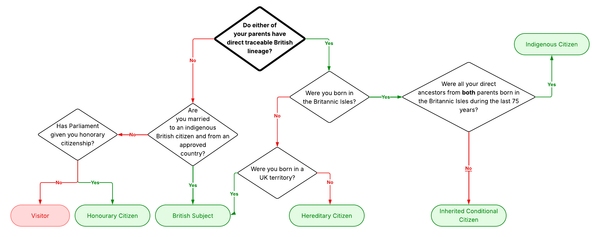Northern Ireland As Our Singapore
Why waste time squabbling with EU bureaucrats about trade borders when we could abolish taxes and tariffs altogether, stimulating a huge surge in economic growth and prosperity for the country's poorest region? From problem child to Cayman-style economic laboratory: a Sovereign Economic Zone.

Northern Ireland languishes as the United Kingdom's economic laggard. GDP per capita sits nearly 20% below the UK average. Productivity remains stubbornly low. Private sector employment chronically underperforms. Young people flee to London, Dublin, or further afield for opportunities simply unavailable at home.
Stormont has failed spectacularly to address this malaise. Years of power-sharing deadlock, petty sectarian squabbling, and bureaucratic inertia have produced nothing but managed decline, despite optimistic reports about minor growth. The assembly spends more time arguing about Irish language acts and legacy issues than creating a single meaningful job or attracting a pound of foreign investment. Meanwhile, the bloated public sector consumes resources whilst generating little productive output.
The disastrous Windsor Framework, supposedly a solution to post-Brexit trade friction, has merely institutionalised Northern Ireland's status as an economic afterthought. Complex dual regulatory systems create confusion for businesses. Endless bureaucratic forms and procedures stifle enterprise. The province remains trapped between regulatory regimes, benefiting fully from neither.
This is not merely disappointing—it represents a catastrophic waste of human potential and geographical advantage. Northern Ireland possesses natural harbours, a skilled English-speaking workforce, excellent transport links, and sits at the crossroads of Britain, Ireland, and continental Europe. These assets cry out for liberation from the dead hand of excessive regulation and punitive taxation.
You can read our draft Sovereign Economic Zone (Northern Ireland) Act (PDF, 25 pages) by using the link below:
This was sent amicably to every Northern Ireland MP, whether or not they sit in Parliament, and whether or not they agree.
How SEZs Transform Nations
Singapore transformed from tropical backwater to global financial powerhouse through radical economic liberalisation. Zero corporation tax for qualifying activities. Minimal bureaucracy. Free movement of capital. Light-touch regulation attracting the world's most dynamic companies.
The British Caribbean territories demonstrate this model works within our own constitutional framework. The Cayman Islands, British Virgin Islands, and Gibraltar have leveraged their unique status to become prosperous financial centres. They abolished most taxes, simplified regulations, and created business-friendly legal frameworks. The result? Extraordinary prosperity, full employment, and governments funded entirely through service fees rather than taxation.
Dubai built itself into the Middle East's commercial capital by becoming a free port where goods flowed without tariffs or bureaucratic interference. Hong Kong's rise to Asian financial centre status rested on similar principles: minimal taxation, maximum economic freedom, and governments focused on facilitating rather than hampering business activity.
These examples share common elements: they abolished barriers to economic activity, attracted global capital through competitive advantages, and created virtuous cycles of investment, employment, and prosperity.
Northern Ireland possesses every prerequisite to replicate this success on a far grander scale.
Special Economic Zones (SEZs) worldwide consistently outperform their surrounding economies precisely because they remove the friction preventing businesses from operating efficiently. They attract investment, create employment, generate innovation, and produce tax revenues through economic activity rather than punitive rates on existing wealth.
Beyond the Windsor Framework
The Windsor Framework represents the worst of all worlds. Northern Ireland remains subject to EU regulations without representation in Brussels. British businesses face additional compliance costs when trading with their own country. The province occupies an economic no-man's land, enjoying neither full access to the British internal market nor seamless integration with European supply chains.
This compromise satisfies nobody whilst limiting everyone's opportunities. Brussels maintains regulatory control without accepting political accountability. London exercises sovereignty without economic benefit. Belfast endures complexity without compensation.
A Sovereign Economic Zone approach abandons this failed compromise entirely. Rather than arguing endlessly about customs codes and veterinary certificates, we simply abolish all taxes and tariffs within Northern Ireland.
No corporation tax to collect means no complex accounting requirements. No customs duties mean no border infrastructure. No VAT means no bureaucratic form-filling.
The trick lies in its simplicity. Instead of negotiating elaborate protocols about sausages and steel, we eliminate the underlying reason for such negotiations. When there are no taxes to collect, customs arrangements become irrelevant. When regulations focus on facilitating rather than restricting trade, businesses can operate freely.
This transforms Northern Ireland from a peripheral problem into a central opportunity. Rather than being trapped between two regulatory systems, it becomes a bridge connecting them. Companies can establish operations in Belfast or Derry, access both British and European markets, and operate under the most competitive fiscal regime in Europe.
The Legal Architecture: What Must Change
Creating a Northern Ireland Sovereign Economic Zone requires systematic legislative reform, but nothing beyond Parliament's established powers. The necessary changes fall into several categories.
Constitutional reform begins with amending the Northern Ireland Act 1998 to transfer comprehensive fiscal powers to Stormont. This means devolving corporation tax, income tax, VAT, customs duties, and excise taxes. The legislation already contains dormant powers for corporation tax devolution—these simply require commencement and expansion.
The Windsor Framework itself must be repealed through domestic legislation. The European Union (Withdrawal Agreement) Act 2020 embedded these arrangements in British law. Parliament can revoke this with a simple majority, exercising the sovereignty it reclaimed through Brexit. Brussels may complain, but they cannot prevent sovereign legislative action.
HMRC's statutory duties require fundamental revision. The Customs and Excise Management Act 1979 and Taxation (Cross-border Trade) Act 2018 currently impose collection requirements across the entire United Kingdom. New legislation must carve out Northern Ireland entirely, transferring these functions to local authorities who will not exercise them.
The UK Internal Market Act 2020 poses potential obstacles by requiring mutual recognition of goods and services across the United Kingdom. However, amendments can exempt Northern Ireland from these provisions, or alternatively, the absence of any restrictions to recognise makes compliance automatic.
Revenue and Customs regulations need wholesale reform. The existing Free Zones regime under the 2021 regulations provides a foundation, but comprehensive zero-tax, zero-tariff zones require bespoke statutory frameworks. These must cover company registration, financial services regulation, and customs procedures.
International trade law actually supports rather than hinders this approach. The World Trade Organisation permits unilateral tariff elimination. Most Favoured Nation rules require equal treatment of all trading partners, which zero tariffs achieve automatically. No international law prevents governments from abolishing their own taxes.
Brussels Fury As A Strategic Asset
The European Union's response will be swift, angry, and counterproductive. Brussels cannot tolerate successful economic liberalisation on its doorstep, particularly when it exposes the costs of their own regulatory overreach. Expect immediate legal threats, trade retaliation, and diplomatic pressure.
This fury represents a strategic asset rather than a problem. European anger confirms the identification of their weak points. Their desperation to prevent Northern Ireland's success demonstrates the approach threatens their entire regulatory model. When bureaucrats panic, entrepreneurs profit.
Dublin faces an impossible choice: they can either facilitate Northern Ireland's transformation, benefiting from increased trade and investment, or implement EU-mandated border controls, strangling their own economic growth.
The Irish government will quickly discover Brussels' abstract principles offer poor compensation for concrete job losses.
If the EU chooses confrontation, it should be met with equal determination. Trade retaliation against British exports can be met with further deregulation and tax cuts, making Northern Ireland even more attractive to international investors. Legal challenges in international courts will take years whilst businesses relocate immediately.
The nuclear option involves extending the model across the Irish Sea to Wales, creating multiple pressure points the EU cannot possibly control. When Holyhead and Milford Haven become duty-free ports alongside Belfast and Larne, Brussels faces an impossible enforcement challenge.
European threats of border infrastructure in Ireland reveal their true priorities. They would rather strangle Irish prosperity than permit joint success. This choice exposes the EU's fundamental hostility to economic growth when it challenges their regulatory supremacy.
Restoration: From Burden to Powerhouse
The economic transformation would be rapid and spectacular. Within months, companies would begin relocating European operations to Belfast, Derry, and smaller centres across the province. Zero corporation tax attracts headquarters. Duty-free status brings logistics operations. Minimal regulation draws financial services.
Northern Ireland's ports would experience unprecedented growth.
- Belfast would rival Rotterdam as a distribution hub.
- Larne would become the natural gateway for trade between Britain, Ireland, and continental Europe.
- Smaller ports like Coleraine and Warrenpoint would find new purposes as specialised trade centres.
Employment would surge across multiple sectors.
- Financial services companies would establish back-office operations taking advantage of lower costs and better connectivity.
- American technology firms would create development centres accessing both British and European talent pools.
- Manufacturing would return as companies sought to minimise regulatory compliance costs.
The multiplier effects would be enormous.
- Higher employment means increased consumer spending.
- More businesses means greater demand for professional services.
- Growing ports require expanded logistics networks.
Success breeds success as the province's reputation transforms from troubled backwater to dynamic business destination.
Government revenues would increase despite zero tax rates.
- Company registration fees, financial services licenses, and port charges would generate substantial income.
- Land values would rise as demand increases.
- Economic growth would reduce welfare spending whilst increasing employment-related revenues.
Most importantly, young people would have reasons to stay.
Northern Ireland would offer career opportunities matching London or Dublin. Graduate retention would increase. Brain drain would reverse as talented individuals returned home to participate in the province's renaissance.
The Sovereign Economic Zone (Northern Ireland) Act
We asked the Great Repeal authors (Coppen and Reiners) if they'd look at it and draft a bill. To do what that narcissistic Trotskyite Blair didn't think of – getting the working class rich to heal their disagreements.
A Bill to establish Northern Ireland as a Sovereign Economic Zone; to devolve comprehensive fiscal and customs powers to the Northern Ireland Assembly; to abolish taxation and customs duties within Northern Ireland; to disapply certain provisions of the European Union (Withdrawal Agreement) Act 2020; to amend the Northern Ireland Act 1998; and for connected purposes.
The Northern Ireland Sovereign Economic Zone Bill represents the most radical constitutional and economic reform in Northern Ireland since partition. The legislation establishes Northern Ireland as a distinct fiscal territory within the United Kingdom, abolishing all forms of taxation and customs duties whilst transferring comprehensive fiscal powers from Westminster to Stormont.
The Bill's core mechanism involves amending the Northern Ireland Act 1998 to devolve complete control over corporation tax, income tax, VAT, customs duties, and all other forms of taxation to the Northern Ireland Assembly. Once devolved, the Assembly exercises these powers by abolishing taxes entirely rather than setting alternative rates. This creates a zero-tax jurisdiction within the United Kingdom whilst maintaining Northern Ireland's constitutional status as part of the Union.
Northern Ireland becomes a separate customs territory where no duties apply to imports from any country, whilst goods moving from Northern Ireland to the rest of the United Kingdom flow freely without customs controls. This effectively creates unilateral free trade for the entire United Kingdom, since businesses can import goods duty-free through Belfast or other Northern Ireland ports and transport them to England or Scotland without restriction.
The legislation deliberately dismantles post-Brexit arrangements by disapplying key provisions of the European Union Withdrawal Agreement Act 2020, particularly those relating to the Northern Ireland Protocol and its successor arrangements. This removes EU regulatory oversight and customs requirements, allowing Northern Ireland to operate under purely British jurisdiction whilst maintaining an open border with the Republic of Ireland through the absence of any customs duties to collect.
Revenue generation shifts to a fee-based model resembling successful offshore financial centres. The Northern Ireland Executive gains powers to charge company registration fees, financial services licensing costs, and port usage fees whilst maintaining public services through either these revenues or continued block grants from Westminster. The Bill establishes a Zone Authority to administer these arrangements and ensure compliance with anti-money laundering requirements.
The constitutional implications extend beyond Northern Ireland itself. By creating internal UK territories with fundamentally different fiscal regimes, the legislation challenges traditional concepts of uniform taxation across the United Kingdom. The Bill includes provisions allowing similar arrangements to be extended to other regions, suggesting this could become a model for broader UK economic reform rather than simply a Northern Ireland-specific solution.
Wales and Beyond: Extending the Model
Success in Northern Ireland would create irresistible pressure to extend the model. Wales shares many of Northern Ireland's challenges: peripheral location, economic underperformance, over-dependence on public sector employment, and frustrated potential.
Welsh ports possess significant untapped capacity.
- Holyhead connects directly to Dublin and continental Europe.
- Milford Haven handles substantial cargo volumes.
- Cardiff and Newport serve growing hinterlands.
Transforming these into duty-free zones would create a western crescent of economic dynamism.
The constitutional mechanics prove simpler in Wales. No international treaty complications exist. The Government of Wales Act 2006 requires amendment to transfer fiscal powers, but the Welsh Government would likely welcome such opportunities. Political consensus around economic development makes implementation smoother.
Jersey, Guernsey, and the Isle of Man already operate distinctive fiscal regimes. Coordinated development could create a network of economic zones spanning the Irish Sea, English Channel, and North Sea. The Isle of Wight's strategic location near major shipping lanes makes it an natural addition.
This network effect multiplies each zone's individual benefits. Companies could operate across multiple locations within a single regulatory and fiscal framework. Goods could flow freely between zones whilst accessing restricted markets beyond. Scale economies would attract larger enterprises requiring multiple operational centres.
The European Union would face impossible enforcement challenges. Policing one special economic zone requires resources. Monitoring five or six distributed across Britain's western and southern approaches exceeds any realistic capability. Each successful zone makes the next one easier to establish and harder to suppress.
The Strategic Vision: Britain Unleashed
This transformation extends beyond Northern Ireland's immediate benefits. Success demonstrates Britain's post-Brexit potential when freed from European regulatory constraints. While Brussels imposes ever-more prescriptive rules, we showcase economic dynamism through systematic deregulation.
The contrast would become undeniable: Northern Ireland's renaissance would coincide with continued European economic stagnation. Dynamic growth versus managed decline. Enterprise versus bureaucracy. Opportunity versus regulation. The comparison would inspire similar movements across Europe as other regions demand their own economic freedom.
International investors would recognise Britain as the developed world's most business-friendly destination. Zero taxes, minimal regulation, and flexible labour markets create unmatched competitive advantages. Capital would flow towards opportunity rather than being trapped by political interference.
The model's success would generate momentum for broader reform. If Northern Ireland thrives without corporation tax, why should England tolerate punitive rates? If duty-free zones accelerate growth, why maintain protectionist barriers elsewhere? Success creates pressure for systematic liberalisation across the entire United Kingdom.
Most importantly, we would have proven that radical economic reform works. Critics claim deregulation benefits only the wealthy whilst harming ordinary workers. Northern Ireland's transformation would demonstrate the opposite: economic freedom creates opportunities for everyone willing to seize them.
A Simple Choice: Freedom
Northern Ireland can remain Europe's subsidised backwater, dependent on transfers from London and Brussels, trapped between incompatible regulatory systems, watching its young people emigrate for lack of local opportunities.
Alternatively, it can become Britain's Singapore—a dynamic hub where enterprise flourishes, where global companies establish their European operations, where young graduates build careers rivalling anything available in London or New York.
The choice is ours. The legal mechanisms exist. The economic logic is compelling. The strategic benefits are enormous.
We can continue endless negotiations about customs procedures and veterinary certificates, accepting managed decline whilst bureaucrats debate technical details.
Or we can unleash Northern Ireland's potential through the simple expedient of getting government out of business's way.
The transformation awaits our decision. Northern Ireland stands ready to become our Singapore. The only question is whether we possess the courage to make it happen.







